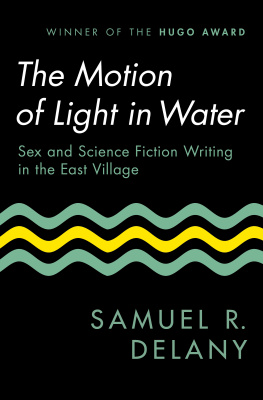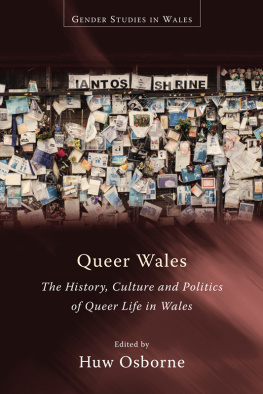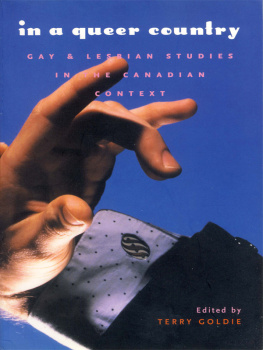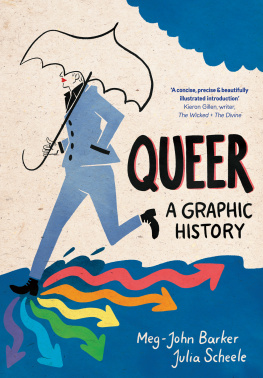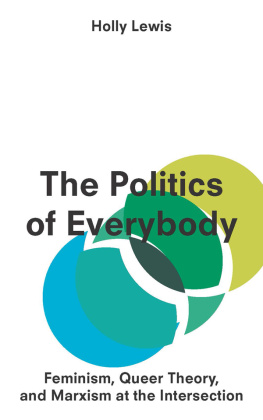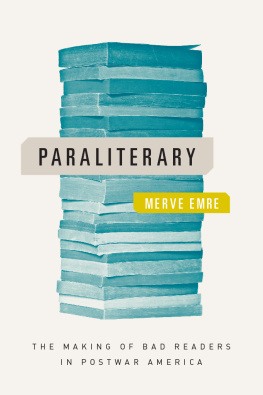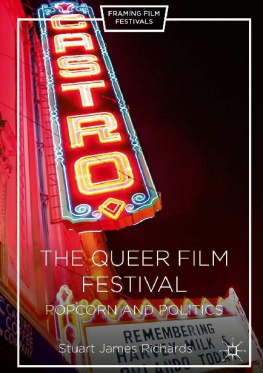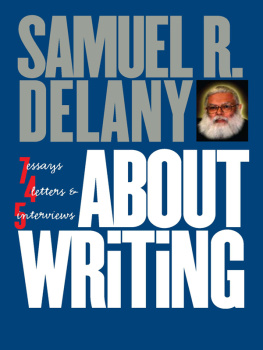Shorter Views
Other Books by the Author
Fiction
The Jewels of Aptor (1962)
The Fall of the Towers:
Out of the Dead City (formerly Captives of the Flame, 1963)
The Towers of Toron (1964)
City of a Thousand Suns (1965)
The Ballad of Beta-2 (1965)
Empire Star (1966)
Babel-17 (1966)
The Einstein Intersection (1967)
Nova (1968)
Driftglass (1969)
Equinox (formerly The Tides of Lust, 1973)
Dhalgren (1975)
Trouble on Triton (formerly Triton, 1976)
Return to Nevron:
Tales of Nevron (1979)
Neveryna (1982)
Flight from Nevron (1985)
Return to Nevron (formerly The Bridge of Lost Desire, 1987)
Distant Stars (1981)
Stars in My Pockets Like Grains of Sand (1984)
Driftglass/Starshards (collected stories: 1993)
They Fly at iron (1993)
The Mad Man (1994)
Hogg (1995)
Atlantis: Three Tales (1995)
Graphic Novels
Empire Star (1982)
Bread & Wine (1999)
Nonfiction
The Jewel-Hinged Jaw (1977)
The American Shore (1978)
Heavenly Breakfast (1979)
Starboard Wine (1984)
The Motion of Light in Water (1988)
Wagner / Artaud (1988)
The Straits of Messina (1990)
Silent Interviews (1994)
Longer Views (1996)
Times Square Red, Times Square Blue (1999)
Shorter Views
Queer Thoughts &
The Politics of the Paraliterary
Samuel R. Delany

Wesleyan University Press
Published by University Press of New England, Hanover, NH 03755
1999 by Samuel R. Delany
All rights reserved
Printed in the United States of America
5 4 3 2 1
CIP data appear at the end of the book
For Patrick Merla & Marc Shell
ISBN 978-0-8195-6369-9
The following works in this collection were previously published:
The Rhetoric of Sex/The Discourse of Desire was initially delivered as a lecture at MIT; it first appeared in print in Heterotopias: The Body Politic, ed. Tobin Siebers, Ann Arbor: University of Michigan Press, 1995.
Street Talk/Straight Talk appeared in Difference, eds. Naomi Shor & Elizabeth Weed, special issue on Queer Theory: Lesbian and Gay Sexualities, guest edited by Teresa de Lauretis, vol. 3, summer 1991, Providence.
On the Unspeakable first appeared in Everyday Life, eds. George and Chris Tysh, Detroit, 1987; subsequently it appeared in Avant Pop: Fiction for a Daydreaming Nation, ed. Larry McCaffery, Fiction Collective-2, Boulder, Colorado, 1993.
Coming/Out appeared first, in slightly different form, in Boys Like Us, edited by Patrick Merla, New York: Avon Books, 1997.
A Bend in the Road first appeared in the Yale Journal of Criticism, eds. Esther da Costa et al, vol. 7, no. 1, spring 1994; New Haven.
The Gay Writer/Gay Writing... ? first appeared in the AWP Journal, 1993.
The Black Leather in Color Interview first appeared in Black Leather in Color, edited by Antoinette, Lidell Jackson, and S. Guy Giumento, no. 3, fall 1994, New York City.
continued on page 458
Contents
Preface
On Creativity and Academic Writing
For twenty-five years Ive taught more creative writing classes than any other sortIve been asked to teach more creative writing classes than any other sort. Creative writing is also the class that has given me the most pause. When I arrive at a new university, some form of the following conversation almost always occurs:
Them: Oh, you will teach a creative writing class, wont you?
Me: Id rather not.
Them: But you seem so eminently qualified to teach creative writing. Youve written so many novels and short stories.
Me: Novels, yes. Stories, no. But I really dont know if I have anything to teach in terms of creative writing.
Them: Oh, but Im sure you do...
Im being somewhat disingenuous. As I said, creative writing is the class I have taught the most, and I suspect it will be the class I shall go on teaching the most. (I am scheduled to teach one such workshop this coming summer.) Certainly its an easy class to fill with pleasant comments, pleasing pastimes, and passably interesting exercises. The problem is, however, philosophicalspecifically, ontological. Im just not sure if creativityas it is presupposed, as it is hypostatized, as it is commodified and reified in endless writing workshops and the brochures they send out to attract writing studentsexists. And I feel the same discomfort teaching a class in creative writing as I would were I a physicist assigned to teach a class in phlogiston physicsassigned to teach it not as a historical reaction of a vanished and discredited theory, but as a modern enterprise all my eager students believed was the latest scientific dope on the realest of real worlds.
In his various notes on nineteenth-century Paris, Baudelaire, and the Arcades, Walter Benjamin makes a most intricately suggestive observation: When, in the ninteenth-century marketplace, industrial products passed a certain number, it became a practical impossibility to know all the relevant facts about each products manufacture, the quality of the materials that went into it, the care and craft with which it had been made, and thus its durability and functionality. To compensate for this general loss of empirical knowledge, the more generalized notion of good taste arose to occupy the interstices, override the positivities, and finally sublate the material interplay of the known and the unknownall that was left of the empirical knowledge about care, quality, manufacture, and efficiency that had gone by the name of quality.
It is, then, in the same sense that I might say that good taste has no ontological status that I suggest a similar denial of ontological status to creativity. That is, while it is a social reality, it is reduciblelike a chemical compoundto its constitutive elements. But, unlike a compound, its fundamental properties are also reducible (as in a chemical mixture) to the properties of its constitutive elements.
Having located this so important relationship between empirical knowledge and good taste, we can fix a number of other concepts that bear the same necessarily mystified relation one to the other. Most important for us today is, I suspect, the relation between individual strength and institutional power; for I would maintain that it is interesting, even necessary if we wish to be effective political citizens, to consider that strength bears the relationship to power that empirical knowledge bears to good taste. Use value and exchange value are another, more classical pair that bear a like relation (and the complexities of their mutual and forever interdependent analyses suggest just how complex this relationshiphowever simple it may look at firstactually is). The relationship of technology to science is one more such relationship. And the relationship of craft to art is still another andin this discussionthe one that most concerns us.
What is problematic about these relationships is that in the second, reified, mystified term from all these pairsfrom good taste to exchange value to power to science to artlies all possibility for both guided and unguided growth, for unconscious response, for both evolutionary and entropic change. That such change and growth have been present in the human universe since caves and chipped flints is the reason that the earlier, positive, and seemingly pure termsknowledge, strength, use value, craft, technologyare never
Next page

